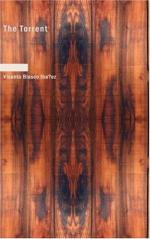Brull knew the barber very well. The man was one of his childhood favorites. Fear of his mother was the only thing that had kept him from frequenting Cupido’s shop—the rendezvous of the city’s gayest set, a hotbed of gossip and practical jokes, a school of guitar playing and love songs that kept the whole neighborhood astir. Besides, Cupido was the freak of the city, the sharp-tongued but irresponsible practical joker, who was forgiven everything in advance, and could enjoy his idiosyncrasies and speak his mind about people without starting a riot against him. He was, for instance, the one person in Alcira who scoffed at the tyranny of the Brulls without thereby losing entrance to the Party Club, where the young men admired his wit and his eccentric way of dressing.
Rafael was still fond of Cupido, though not very intimate with him. In all the sedate, conservative world around him, the barber seemed the only person really worth while talking with. Cupido was almost an artist. In winter he would go to Valencia to hear the operas praised by the newspapers, and in one corner of his shop he had heaps of novels and illustrated magazines, much mildewed and softened by the damp, and their leaves worn through from continual thumbing by customers.
He had very little to do with Rafael, guessing that the youth’s mother would not regard such a friendship with any too much favor; but he displayed a certain liking for the boy; and addressed him familiarly, having known him as a child. Of Rafael he said everywhere:
“He’s the best one in the family; the only Brull with more brains than crookedness.”
Nothing too small for Cupido to notice ever happened in Alcira. Every weakness, every foible of the city’s celebrities was made public by him in his barbershop, to the delight of the Opposition, whose members gathered there to read their party organ. The gentlemen of the Ayuntamiento feared the barber more than any ten newspapers combined, and whenever some famous Conservative minister referred in parliament to a “revolutionary hydra” or a “hotbed of anarchy,” they pictured to themselves a barbershop like that of Cupido, but much larger perhaps, scattering a poisonous atmosphere of cruel gibe and perverse effrontery all through the nation.
The barber was inevitably on hand where anything was going on. It might be at the very end of the suburbs, or away out in the country. In a few moments Cupido would put in an appearance to learn all about it, give advice to those who might need it, arbitrate between disputants and afterward tell the whole story with a thousand embellishments.
He had plenty of time on his hands for leading such a life. Two young fellows, as crazy as their employer, tended shop. Cupido paid them with music-lessons and meals—better or worse these latter, according to the day’s receipts, which were divided fraternally among the three. And if the “boss” sometimes astonished the city by going out for a walk in midwinter in a suit of white duck, they, not to be outdone, would shave off their hair and eyebrows and show heads as smooth as billiard-balls behind the shop windows, to the great commotion of the city, which would flock en masse to see “Cupido’s Chinamen.”




